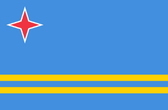
Call 0330 880 3600 Calls may be monitored or recorded. Opening Times.
- TRAVEL INSURANCE
- COVID-19 COVER
- More Options
- Help & Advice
- Existing Customers

Call 0330 880 3600 Calls may be monitored or recorded. Opening Times.

Need help?
UK Customer Services0330 880 3600*
Open Monday to Friday 9:00am to 6pm, Saturday 8:30am to 4pm and closed Sundays.
*Calls are recorded for training and quality purposes.

Official name: Aruba
Capital city: Oranjestad
Official language: Dutch and Papiamento
Population: Around 107,000
Currency: Aruban florin (AWG) - US dollars are also widely accepted
Time zone: GMT-4
Driving side: Right
Climate: Hot and sunny all year, with very little seasonal change
Aruba is a tiny Caribbean island just off the coast of Venezuela, part of the Kingdom of the Netherlands. Famed for its powdery white beaches, clear turquoise waters, and reliably sunny skies, it’s a favourite with holidaymakers seeking guaranteed warmth. The island’s culture is a colourful mix of Dutch, Caribbean, and Latin American influences, reflected in its language, food, and lively music scene.
Covering only 180 square kilometres, Aruba is flat and arid compared to many other Caribbean islands. Instead of rainforests, you’ll find cacti, divi-divi trees shaped by the trade winds, and striking rocky outcrops. It’s part of the so-called ABC islands (with Bonaire and Curaçao) and sits mostly outside the hurricane belt, making it a safer bet for year-round sun. That said, the June–November hurricane season still brings occasional tropical storms.
Tourism is the backbone of Aruba’s economy, and visitors benefit from good infrastructure. Queen Beatrix International Airport connects the island to major cities in North America, Europe, and nearby islands. Getting around is straightforward: public buses run between main towns, taxis are reliable, and car hire is widely available. Roads are in good condition, and driving is on the right. Aruba is considered safe, with low crime rates, though petty theft can happen, especially in busy tourist areas - so sensible precautions are recommended.
British nationals don’t need a visa for short trips (usually up to 90 days). You’ll need a valid passport and may be asked for proof of accommodation or onward travel. Rules can vary for longer stays or other nationalities, so check with a Dutch embassy or consulate if in doubt.
The Aruban florin (AWG) is the official currency, but US dollars are widely accepted and often the easiest option for tourists. Many prices are listed in both currencies. ATMs are widely available, and credit and debit cards are accepted in most hotels, shops, and restaurants.
Healthcare in Aruba is of a high standard for the region, with a main hospital in Oranjestad and several clinics. Routine vaccinations should be up to date. While tap water is safe to drink thanks to the island’s desalination plant, mosquito-borne illnesses like dengue and chikungunya do occur, so insect protection is wise. Serious medical cases may require evacuation, so comprehensive travel insurance with medical cover is strongly recommended.